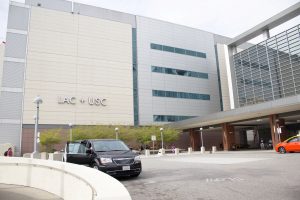Malpractice suits settled against surgeon
During his tenure as a spinal surgeon at the David Geffen School of Medicine at UCLA, Jeffrey Wang performed numerous surgeries, but two stand out — those of Jerome Lew and Ralph Weiss. Today, Wang is the co-director of the USC Spine Center, and in late July, the University of California regents agreed to pay $8.45 million to settle two malpractice lawsuits filed by Lew and Weiss against him.

Jessica Zhou | Daily Trojan
Doctor’s orders · Wang began working at the Keck School of Medicine after leaving UCLA in 2013, while litigation was still pending against him.
In the lawsuits, the two patients alleged that Wang failed to disclose his financial ties with Medtronic, a medical device company, before using Medtronic’s products in their surgeries. Lew and Weiss, who received $4.2 and $4.25 million in the settlement, respectively, further alleged that Wang never informed them the surgery involved using Medtronic’s products in “off-label” ways never tested for safety.
Wang’s financial relationship with Medtronic involved consulting work and royalties for Medtronic products, according to the lawsuits. The plaintiffs alleged that not only did Wang receive royalties from the Infuse Bone Graft used on Lew and Weiss, but a sales representative from Medtronic was in the operating room during Lew’s surgery. From 2004 to 2013, Wang received over $275,000 in royalties, consulting fees and speaking fees from Medtronic alone.
In Lew’s case, Wang inserted Infuse, designed for use in the lumbar region of the spine, into Lew’s cervical spine, a use that had never been approved by the Food and Drug Administration. A year prior to Lew’s surgery, the FDA had warned health care practitioners that use of Infuse in the cervical spine could be fatal. The bone overgrowth caused by improper use of Infuse caused Lew permanent nerve damage and chronic pain that has persisted despite several corrective surgeries, according to the lawsuit.
Though doctors are permitted to use products in unauthorized ways at their discretion, it is illegal for medical companies to advertise those “off-label” uses. Documents in Lew’s case showing evidence of Medtronic employees promoting Infuse’s use in the cervical spine led to a separate confidential settlement between Lew and Medtronic.
Weiss had only consented to the operation because Wang promised to perform the surgery personally. However, Wang was not present for the first few hours of the surgery, in violation of UCLA and UC policy, instead entrusting critical portions of the surgery to an assistant who then operated on the wrong area of the spine.
“When he first came to the operating room, it was after receiving a phone call saying, ‘We blew it,’” Weiss said. “I didn’t find out until a year after the surgery that he wasn’t even there, that he had just let them run amok. For one of the two residents, I was the first surgery on the first day of his residency, so I was the lucky — or unlucky — person to have him cut his teeth, so to speak, and he just blew it.”
UCLA Health spokesperson Tami Dennis said in a statement that the UC regents settled the lawsuits in order to continue their commitments to patient care, research, education and community service.
“Developing and maintaining public trust are essential to the outstanding medical care and research that are UCLA Health’s hallmark, and we strive for our physicians and staff to conduct themselves in a manner consistent with the highest ethical standards,” Dennis wrote.
Wang had previously been caught up in a 2009 U.S. Senate investigation into corporate payments to doctors, which found that Wang had failed to report nearly $460,000 received from pharmaceutical companies.
In 2013, while the lawsuits were pending, Wang was hired by USC as the co-director of the USC Spine Center. On his online profile for the Keck School of Medicine, he is described as having a “… reputation for consistently providing excellent patient care, outstanding qualifications and experience [that] has earned him immense respect from patients and physicians alike.” Wang and the Keck Department of Orthopaedic Surgery declined to comment on the lawsuit.
“It’s all motivated by greed,” Weiss said. “He’d already had problems with these conflicts that had been undisclosed, and the only thing that makes sense to me is that they kept him at UCLA because he’s big business. I don’t know for sure what entered into SC’s hiring decision, but my guess is they looked the other way because they make money off of him.”
Though the settlement was a positive outcome for the plaintiffs, Weiss expressed frustration that Wang did not accept culpability.
“It’s not uncommon for the hospital to pay as opposed to the physicians,” Weiss said. “I would have thought it would have been more appropriate for him to pay, because some of what we were suing him for were pretty egregious acts.”
During settlement negotiations, Wang’s attorneys had pushed for a confidentiality clause to limit the plaintiffs from speaking about the case, but they refused in hopes that the lawsuit would bring attention to the influence that industry money has on the trust between doctors and patients.
“If you’re a physician, you’re allowed to have a relationship with a drug manufacturer, but you can’t keep it secret from your patients. You have to let them know,” Weiss said. “I think it sends a terrible message [for USC] to look the other way, no matter how much business the guy brings in. You’re supposed to protect the patients. You’re supposed to follow the rules.”

